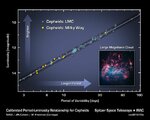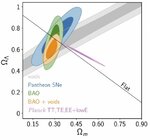One of the most precise measurements ever made of the speed of
the universe's expansion has been completed, thanks to NASA's Spitzer Space Telescope, and it's quite surprising. Space itself is expanding at a rate of 74.3 plus or minus 2.1 kilometers (46.2 plus or minus 1.3 miles) per second per megaparsec (a megaparsec is roughly 3 million light-years). It's fast and it's getting faster all the time.
American astronomer
Edwin P. Hubble first discovered that our universe isn't static in the 1920s. In fact, Hubble found, space has been expanding since it began with the Big Bang 13.7 billion years ago. Then, in the 1990s, astronomers , Saul Perlmutter, Brian Schmidt and Adam Riess, shocked the world again with the revelation that this expansion is speeding up (this discovery won them the
2011 Nobel Prize in physics).
Ever since Hubble's initial discovery, scientists have been trying to refine their measurement of the universe's expansion rate, called the Hubble Constant. It's a hard measurement to make.
The new value (image 1) reduces the uncertainty in the Hubble Constant to just 3 percent, and improves the precision of the measurement by a factor of 3 compared to a previous estimate from the Hubble Space Telescope.
"Just over a decade ago, using the words 'precision' and 'cosmology' in the same sentence was not possible, and the size and age of the universe was not known to better than a factor of two," Wendy Freedman of the Observatories of the Carnegie Institution for Science in Pasadena, Calif., said in a statement. "Now we are talking about accuracies of a few percent. It is quite extraordinary."
The new measurement doesn't just tell scientists how fast the universe is expanding, but helps shed light on the mystery of why this expansion is accelerating. Dark energy is the name given to whatever is causing the universe's expansion to speed up. Yet scientists have little idea what it is.
By combining the new value of the Hubble Constant with observations of the universe by NASA's Wilkinson Microwave Anisotropy Probe (WMAP), the scientists were able to make an independent calculation of the strength of dark energy, which is battling against gravity to pull the universe outward.
"This is a huge puzzle," Freedman said. "It's exciting that we were able to use the Spitzer Telescope* to tackle fundamental problems in cosmology: the precise rate at which the universe is expanding at the current time, as well as measuring the amount of dark energy in the universe from another angle."
Astronomers have looked at other ways to measure cosmic expansion. One way is to measure how galaxies cluster at large scales. Galaxies clusters have formed because of small variations in the density of the early universe known as
Baryon Acoustic Oscillations (BAO) (Figure 2). As gravity tries to pull galaxies closer together, dark energy tries to drive them apart. As a result, galaxies have formed into dense superclusters separated by large voids. The size of these voids allows us to measure the Hubble parameter.
Recently, Elizabeth Blanton from Boston University and her team (Rachel Paterno-Mahler (GRS'15), PhD candidate Emmet Golden-Marx (GRS'16,'19), Gagandeep Anand (GRS'17), Joshua Wing (GRS'07,'13), and colleagues at the University of Missouri-Kansas City and the Harvard-Smithsonian Center for Astrophysics) made the most comprehensive measure of galaxy clustering. They found several interesting things. To begin with, since the structure of the voids depends on both dark energy and the overall shape of space, the team confirmed that the universe is spatially flat. Cosmic curvature can’t account for the different values. For the Hubble parameter, they got a result of about 70 – 74 (km/s)/Mpc, which agrees with the larger supernova result. But their observations focused mainly on galaxies with a redshift of z < 2, or within about 9 billion light-years. When the team added data from more distant galaxies, their result shifted to 68 – 70 (km/s)/Mpc, which better agrees with the Plank result.
Woven into this cosmic web are clues to two major cosmic mysteries: dark matter, the invisible stuff that permeates galaxies and the spaces between them, and dark energy, which is driving the accelerating expansion of the universe. Together, dark matter and dark energy make up some 95 percent of our universe, scientists suspect, but astrophysicists know of dark matter and dark energy's existence only indirectly, by their influence on the stars and galaxies that light up the sky.
* The Spitzer Telescope was launched to provide a unique, infrared view of the universe and allow us to peer into regions of space that are hidden from optical telescopes. The Spitzer Space Telescope, formerly the Space Infrared Telescope Facility, was an infrared space telescope launched in 2003 and retired on 30 January 2020. The Spitzer Space Telescope is a NASA mission managed by the Jet Propulsion Laboratory at CalTech.
See:
Spitzer Space Telescope NSSDCA/COSPAR ID:2003-038A
"Speed of the universe's expansion measured better than ever" by Clara Moskowitz, Space.com., October 03, 2012.
"Galaxy clusters offer clues to dark matter and dark energy" by Kate Becker, Boston University, Phys Org, August 28, 2017



